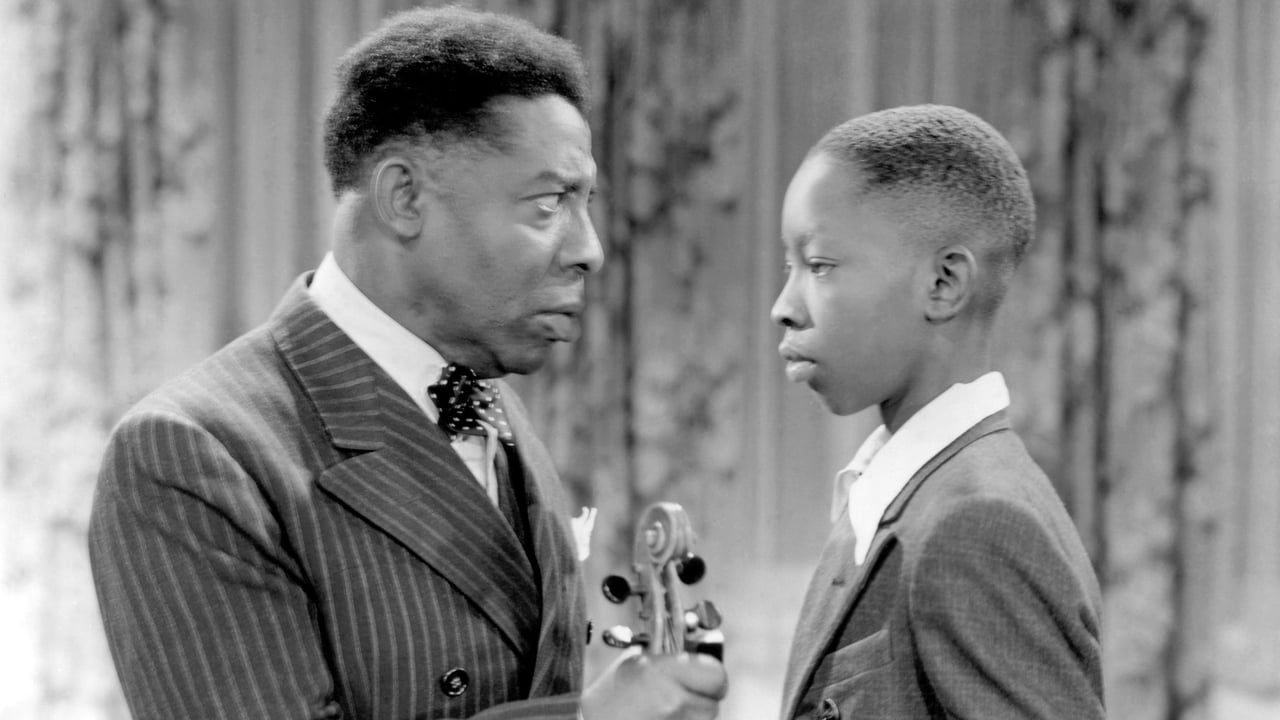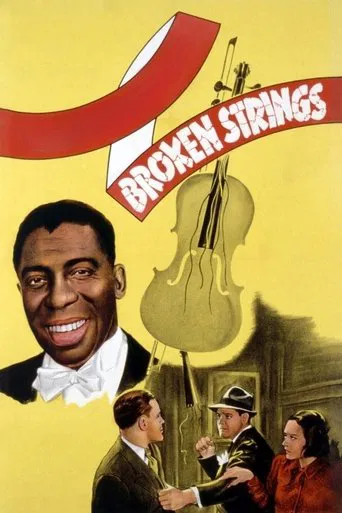RyothChatty
ridiculous rating
Intcatinfo
A Masterpiece!
Hadrina
The movie's neither hopeful in contrived ways, nor hopeless in different contrived ways. Somehow it manages to be wonderful
MartinHafer
Back in the bad old days of racial segregation, black movie patrons often were not allowed into whites only theaters in the States. Not surprisingly, a small industry sprung up--black movies to be shown in blacks only theaters. Unfortunately, because the audiences were much smaller, there wasn't nearly as much money to be made with these black films...and the budgets were incredibly small. While these films today are interesting from a historical standpoint, you can't help but notice that the acting is often very suspect--as well as the direction. The usual Hollywood polish is missing and the films try hard but aren't particularly great films. An example of this is "Broken Strings"...a well intentioned movie that tries very hard but its shortcomings are obvious.When the film begins, Arthur Williams (Clarence Muse) is doing a classical recital with his violin. He's brilliant and his future looks bright but he's soon in a traffic accident and his hand is injured...and his career is over. As a result, he's left making a few dollars giving violin lessons. However, he also has become a cranky jerk and is enraged when his young son begins playing swing music...and he forbids this. However, when a doctor is willing to try to repair Arthur's hand, the son goes to work performing in clubs...and he keeps it a secret. What's next? See the film.The plot of "Broken Strings" is very much a reworking of "The Jazz Singer" and the film is entertaining. But even good actors (such as Muse who was a crossover hit in mainstream films) looked poor when delivering their lines...because the direction wasn't good and they didn't have the money to re-shoot scenes. It's a shame, as the film could have easily been better.By the way, pay attention to the bratty, jerk-face kid, Dickie, who takes violin lessons--that's Stymie Beard of the "Our Gang" shorts.
Michael_Elliott
Broken Strings (1940) *** (out of 4) This is without a doubt the best of the early black cinema films I've seen. Clarence Muse plays a classical violinist who loses movement in his hand after suffering an accident. Unable to perform, he picks up teaching students as well as his son but soon he begins to have a mental breakdown. Things aren't getting any better when he realizes his son doesn't want to play classical music but instead the son finds a liking to swing/jazz. Unlike some of of the other black cinema films I've watched this year, this one here features a wonderful group of talented folks so there's none of the bad acting that I've seen in previous films. Some will recognize Muse from films such as White Zombie, The Lost Weekend, Double Indemnity and Car Wash but none of them really gave him the chance to act. He does a very good job in his role here, although there are a few times where he goes a bit too over the top. Our Gang member Matthew "Stymie" Beard also appears as one of the students. The film tacks on an incredibly silly ending but the 60-minutes fly by with some nice laughs and some nice drama.
msladysoul
This is by far the one of the top best of Black Cinema films. This truly was an excellent cast who had experience in acting and it shows. The cast weren't people picked up off the street like some in Black Cinema but trained actors and actresses. For an almost 60 minute movie, it's very fulfilling, fast pace but understandable. Clarence Muse, one of the great Black actors who don't entirely get the recognition he deserves gets one of his few opportunities to star in a movie and show his talent, most of his work were as stereotypes in Hollywood movies. Clarence plays a great violinist who loses the use of his hand but through his son, who has the same talent, he tries to live through and wants him only to play classical music, no swing or jazz, he's almost violently opposed to him playing swing but realizes soon after much convincing that all music is beautiful when he gains the use of his hand again. Sybil Lewis is the leading lady who would remind you of a Rosalind Russell, is a wonderful black actress who we don't hear about and many don't know her but in every role she's a natural, she plays the daughter of Clarence Muse character. Tomiwitta Moore is another wonderful, lovely black actress who's very charming in her role, she plays a young teen girl when she was really in her early 20's but because she was so petite, young looking and had a girlish voice she could play young girls or adult women. Tomiwitta and Sybil had better chances to be actresses, create their own images in Black Cinema, they had more control, they didn't have to be stereotypes and play monotonous roles like the black actresses in Hollywood. These ladies should be remembered more but because they didn't cross over their over looked yet they contributed to cinema and open doors by proving Blacks could be successful on their own making their own films showing if you want things done right do it yourself because you can't expect others to represent you rightfully and that's what ones in Black Cinema proved. Edward Thompson is wonderful as the trouble-making son of the boss who makes trouble when he can't have his way with Sybil Lewis character and tries to sabotages her boyfriend played by classy Pete Webster who all work at the same place. William Washington is wonderful as the young son who is a talented violinist who wants to prove to his father that swing can be beautiful music too but he has to suffer for it. Darby Jones is so entertaining and charming. You'll love his snake hips dance. The cute, talented Stevens Sisters are quite an eyeful, what ever happen to talent like that? Ruby Dandridge, Dorothy Dandridge mother is in this film and has a few scenes of comedy, you sure can tell that's Dorothy's mother. Stymie Beard, as we all know from the Little Rascals is great as the sneaky, conniving stool pigeon who tries to sabotage William Washington because he's better as a violinist. Also, Clarence Brooks and Jess Lee Brooks has small parts in the film, it's always good to see them. Elliott Carpenter illustrates how any form of music is beautiful. I love it when he says, "Blacks are the most musical people because they have suffered and know how to express music more soulfully and heartfully." Music can talk without saying a word.This truly is a great film, I'm sure if it was a white cast it would be known and shown more. I also like this film because it shows a different side of Blacks that Hollywood wouldn't dare show. In this movie Blacks are who they really are, their elegant, classy, well-dressed, well-spoken in this movie. I love to watch these films to see Blacks in the nightclubs enjoying each other's company and presence, having a good time, showing they weren't always down and sad people. Black filmmakers today should check out Black cinema films such as this one, these movies give better portrayals of Blacks then today's films and the black movie stars today are able to be stars but selling out to be one, they aren't anything like Blacks in these types of movies.I love the part where Clarence Muse says basically he's happy to be playing for his people because he and they share a kinship, a bond, and basically he hopes to be a credit to his race and history. Basically, he doesn't need whites approval or validation to feel like somebody like most black stars feel the need to cross over to whites, win so-called white awards to feel like somebody but this character feels otherwise and you hardly ever hear Blacks speak like that. That's the problem with today's generation if they used their talent to try to be a credit and good role model for their race and open doors they wouldn't be thinking about degrading themselves or their race they would want to use the talent they inherit from their culture for good.This film also shows that Blacks were capable of playing roles and stories of people from all walks of life. Just because your Black doesn't mean the only stories you can act in has to be black-oriented. This is a black cast but color and race is not even a topic, just blacks being human beings and only through these Black cinema films were they able to be this way, even today, Blacks rarely get a chance to be human beings and play colorless parts. You'll enjoy this film with your family because it's timeless. Movies aren't made like this anymore. I wish this movie could be shown more, like on Turner Classic Movies, instead of ones just happening to find it.
Arthur Hausner
Except for the hokey ending, I enjoyed this family drama which touched on the artificial dichotomy of classical music and swing or jazz. Clarence Muse is excellent as a concert violinist who lost the use of his left hand after an automobile accident, and is reduced to teaching for a living. His son, Walter Washington, plays the violin well, but prefers swing and jazz, which leads to conflicts because Muse doesn't consider those forms of music worthy of being played. There are good subplots too, involving Muse's daughter, nicely played by Sybil Lewis.This being a "race" movie intended for black audiences, other musical entertainment was a must, and there are two items I enjoyed. The first had the young Stevens sisters (introducing themselves as Charmain, Cecile and Leonetti) sing and dance to a song called "Kentucky Babe." And the second was Darby Jones doing a rubberlegs kind of a dance that was excellent, especially since I knew him only from his playing African savages in two Tarzan movies and in Congo Maizie (1940). It took an all-black movie to demonstrate this talent.

